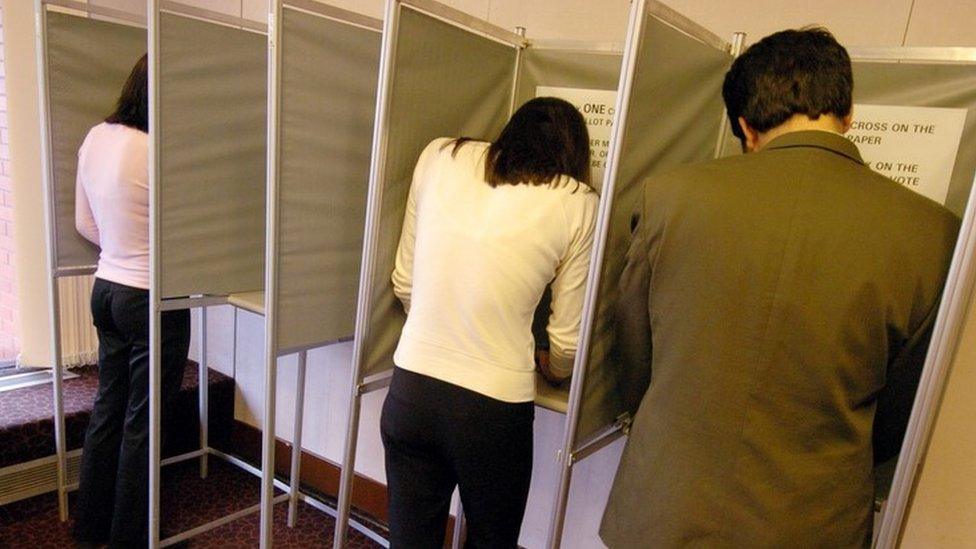Council elections: 'Not enough' women and minorities stand
- Published
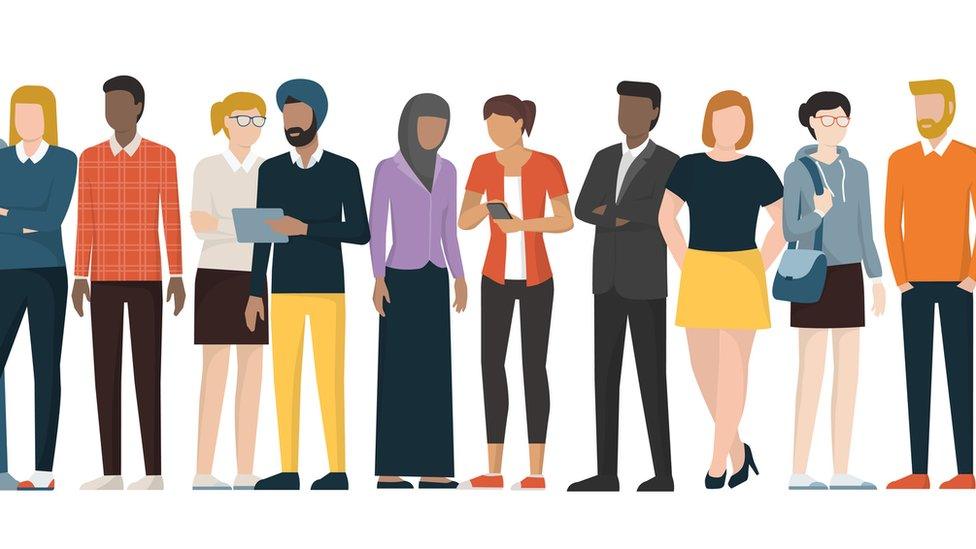
Your local councillors probably don't look like this
Voters around England will be heading to polling stations next Thursday to vote in local elections. And chances are many will be faced with a ballot paper mainly containing the names of white men of a certain age. Does it matter, and why are women, younger people and those from black, Asian and minority ethnic backgrounds less likely to stand for election?
The average councillor in England is 59, white and probably called David or John.
Councils have been criticised for being "too slow" to encourage women and people from BAME communities to stand.
A census suggests 96% of councillors are white and two thirds are male.
Analysis by the BBC ahead of the council elections in May shows there are almost 1,000 candidates named either David or Dave. This compares with 151 called Sue, the most popular female name.
Candidates who are elected will get to oversee budgets worth millions of pounds, decide how often bins get empted, where new housing estates can be built and what services to provide or cut.
However, the most recent census of councillors in England by the Local Government Association (LGA) showed a far higher proportion of councillors are white, male and over 60 than the population.
Local elections: What are they all about?
David and John are the most common candidate names
Analysis of data on candidates, external standing in 248 council areas on 2 May showed 818 people called David are seeking a council seat, with another 140 called Dave. There are 765 Johns.
Ranked in order of popularity, there are 22 male names and one unisex name before Sue, the most common name for a female candidate.
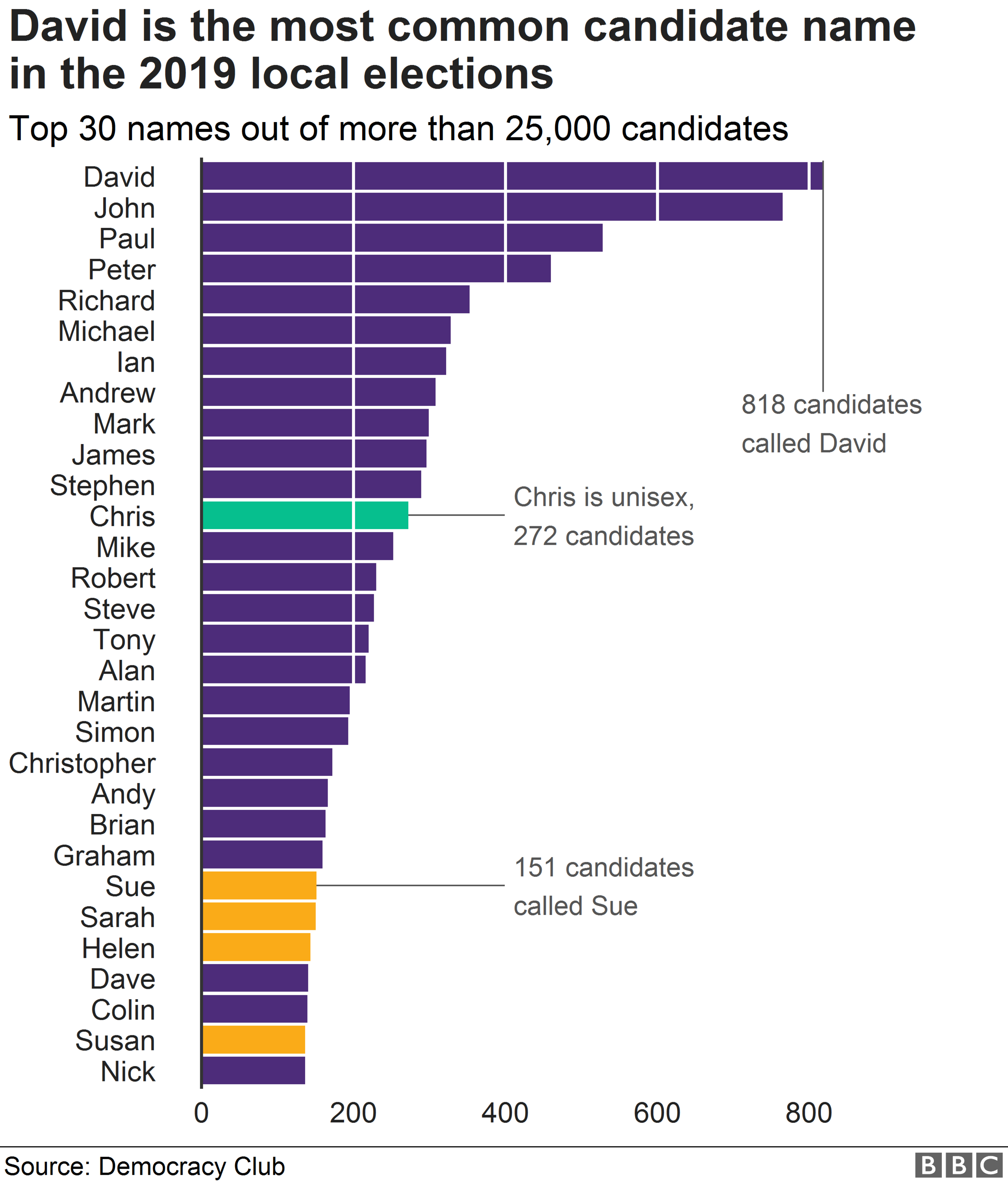

The vast majority of councillors are white
Since 2004 the proportion of white councillors has moved very slightly, down from 96.5% to 95.8%, the LGA survey found.
The proportion of black, Asian and minority ethnic (BAME) councillors was far lower than the overall population.
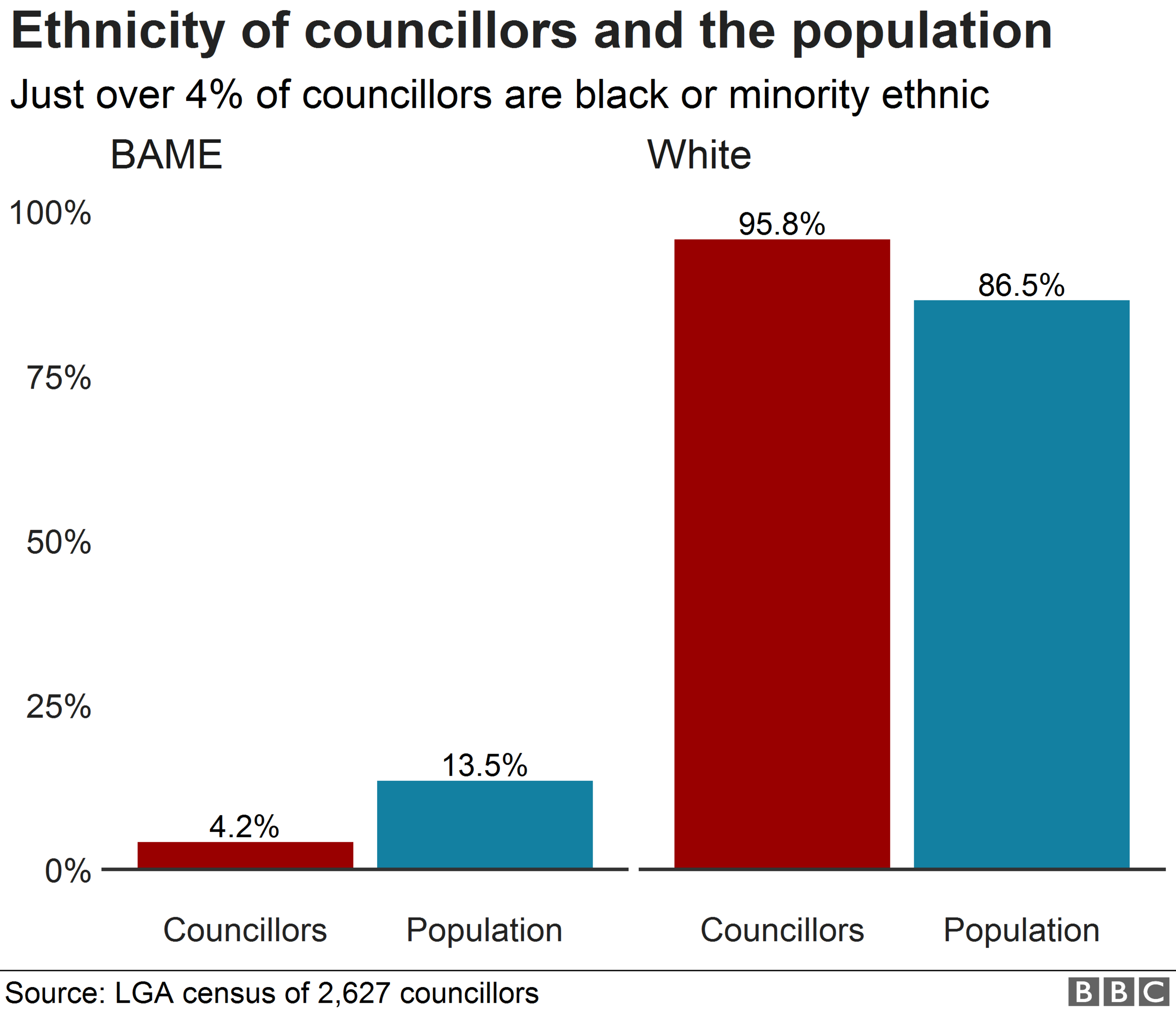
Campaign group Operation Black Vote told BBC 5 Live there should be all-black shortlists to tackle the lack of diversity.
Simon Woolley, director of operations, said: "Unless you have a voice, then things are done to you, not for you.
"Communities turn away because they can't see themselves, they can't see policies that reflect their concerns and they say 'why bother'."
He said the lack of diversity was "desperate" and needed "radical" solutions.
"I don't think in local party politics it [all-black shortlists] would work, but in national party politics it should be considered."
Councillors are getting older
More than a quarter (26%) of councillors in England are over 70 years old. This is up from 14% in 2004, the LGA census suggested.
However, the proportion under 40 has also risen from 7% in 2004 to just over 10% in 2018.
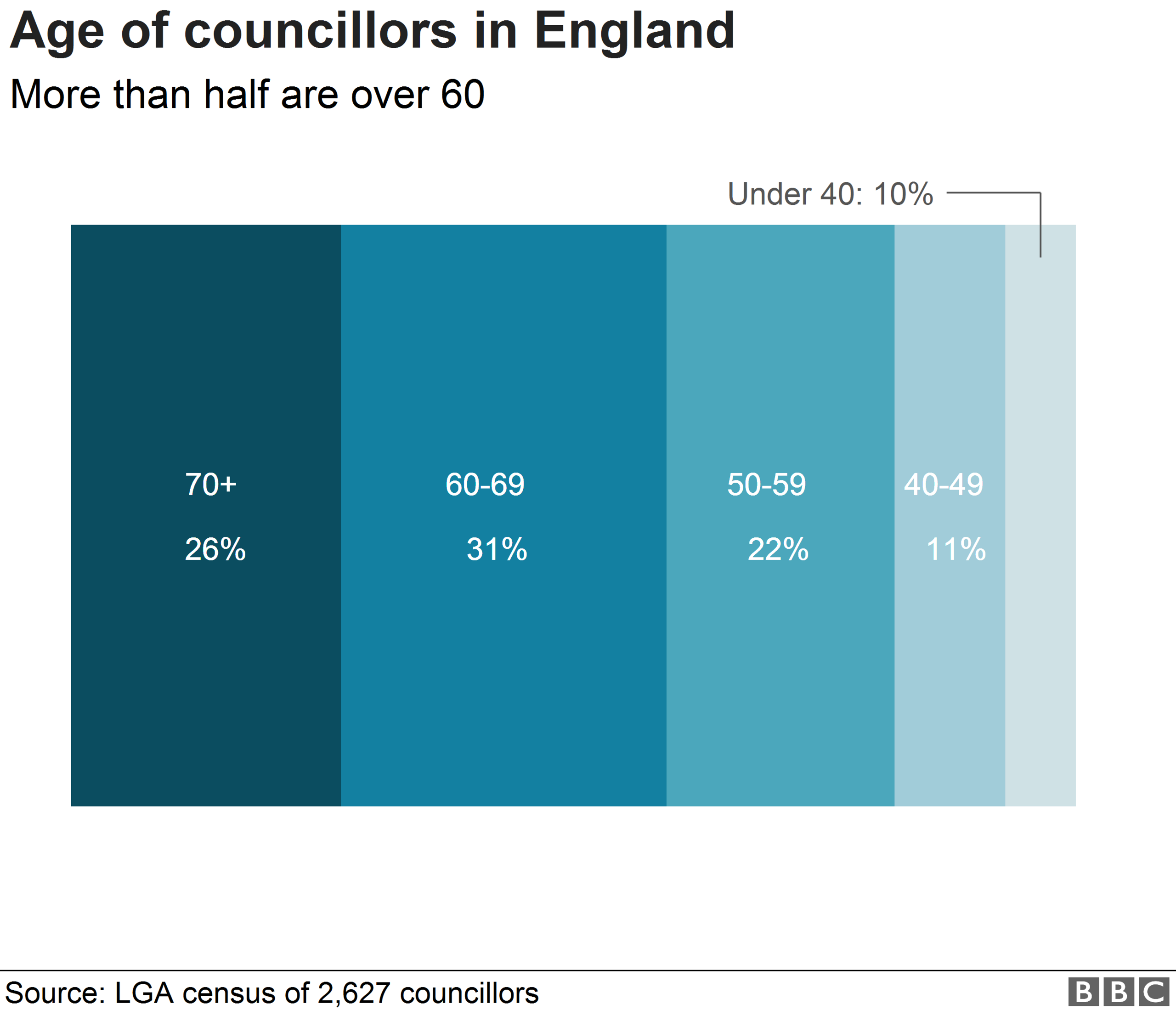

'They said they needed us'
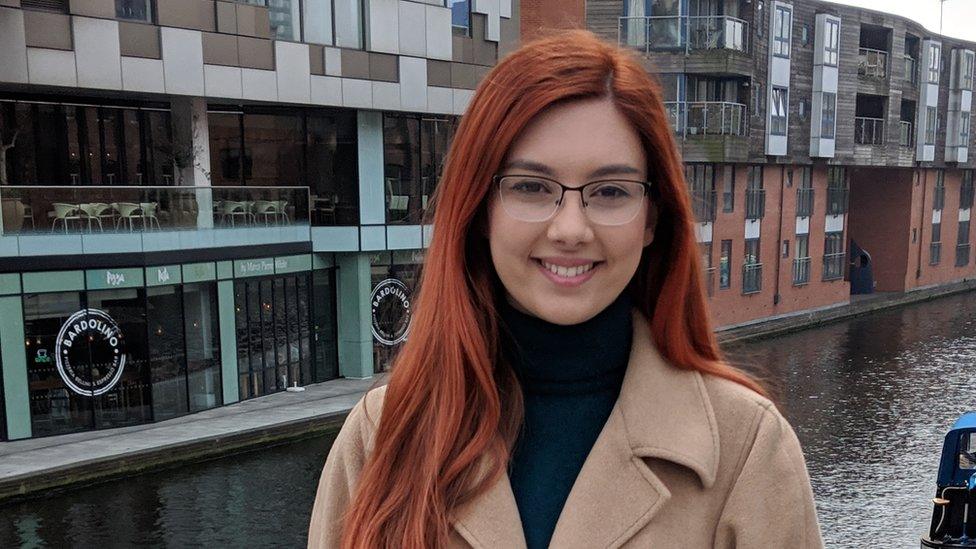
Amara Betts-Patel has served as a councillor while studying full time
Lancaster City Council has five councillors under 25 years old. One of its wards covers the campus of Lancaster University.
Amara Betts-Patel is standing down in May, before she goes into the final year of her linguistics degree.
The 20-year-old from Halesowen, West Midlands, said her fellow councillors encouraged her to get involved.
"They came and said they needed students," she said, referring to the by-election in 2018 when she stood for her seat.
"Being a young person does makes it more difficult to decide to do this.
"There are no access points to understand how serving on a council works. You have to go to meetings and listen to what they are talking about. To a lot of people it can sound like gibberish."
Councillor Betts-Patel said councils needed to make it easier to understand what powers councillors had and what they could do to help people.
"Things will not change until younger people see someone similar to themselves doing this job, balancing it with work or studying and see it is for people like them."
'There is a lot of pressure on young people'
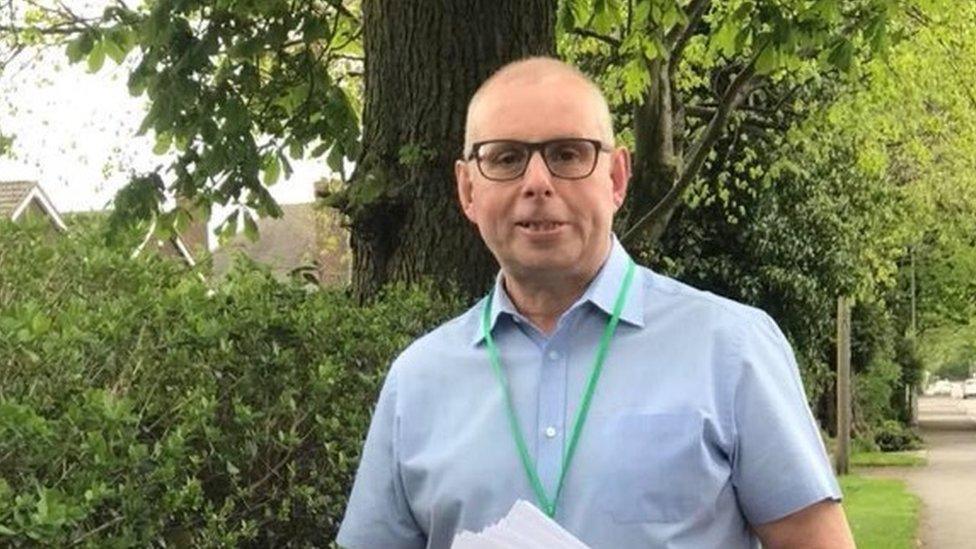
David Clifft believes younger people face career pressures that put them off becoming councillors
David Clifft is almost Mr Average when it comes to local councillors.
The 57-year-old from the West Midlands has the most common name for a candidate and is only two years off the average age for a councillor.
"It is very difficult for younger people to decide to do this," he said. "People in their 20s and 30s are starting or getting on with their careers and there is a lot of pressure on them to climb the ladder.
"It is easier for people of my age if the mortgage is paid off and we can afford to give up the time at work."

The number of women is growing, but still low
The LGA census for 2018 suggested about 36% of councillors were women. This was up from 29% in 2004.

Rachael Farrington of Voting Counts, which encourages people to use their vote, said: "It is important that people feel there are candidates who can represent people like them and understand the day to day lives and issues facing the community.
"If voters feel their circumstances are not represented, they may feel that their interests will never be considered by authorities and be inclined not to vote."
Andrew Bazeley from the Fawcett Society campaign group said: "The pace of change is still far too slow when it comes to getting more women on to councils across the country - and more diverse representation in terms of ethnicity, age, and disability too."
He said councils needed to "change the way they do business", putting in place maternity and childcare policies, better meeting hours, and systems to "stop harassment and sexism in the council chamber".
An LGA spokesman said: "It is vital that the make-up of councils reflects their communities and their experience.
"The LGA has been constantly working with councils towards increasing diversity and inclusion."
He said the association had created a toolkit, external for councils to support "councillors who are women, parents and carers".
- Published9 April 2019
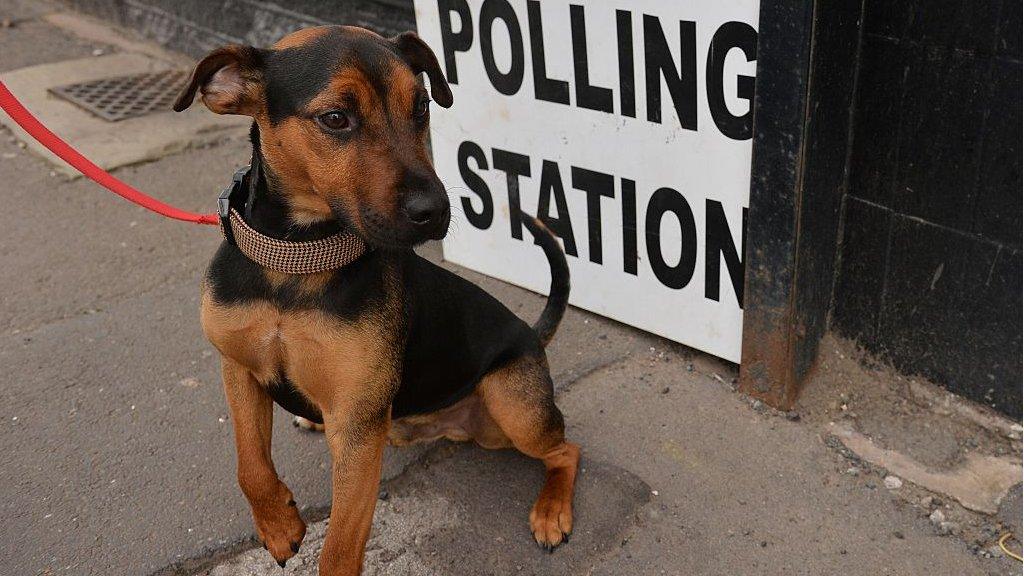
- Published17 April 2019
